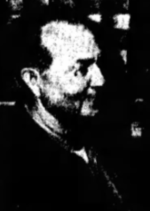 The Daily Herald (Provo, UT) 3/9/1969 Sentenced to life in prison in 1936 for the murder of a police officer in Seminole County, Oklahoma, Paul Goodwin was exonerated over thirty years later after new testimony was provided to support other evidence that a different man was solely responsible for the police officer’s murder. On July 4, 1936, Seminole police officer Chris Whitson was shot to death when he attempted to stop an automobile in which two men were riding. The automobile, reported stolen, was abandoned shortly afterward. On July 10, 1936, at the urging of his mother, former convict Horace (“Buster”) Lindsey surrendered to the authorities in Shawnee, Oklahoma. In confessing to his involvement in the shooting of Whitson, 22-year-old Lindsey provided a written statement that implicated 21-year-old Paul Goodwin as his accomplice. A manhunt ensued to locate Goodwin, who was eventually arrested and booked in Pensacola, Florida, on July 20, 1936. Oklahoma officers then removed Goodwin from jail in Florida, without extradition papers or waiver, and returned him to Oklahoma, staying in various jails along the way. Goodwin was given an “automobile arraignment” before the Seminole Justice of the Peace. Goodwin asked for counsel and counsel was denied. The Justice of the Peace waived Goodwin's preliminary hearing. On August 11, 1936, Seminole County Superior Court Judge Guy C. Cutlip appointed Wewoka, Oklahoma attorney C.L. Hill to represent Goodwin as counsel. Goodwin was not advised of the appointment for fifty-seven days. On October 7, 1936, Attorney Hill visited Goodwin in jail for the first time, five days before trial was to commence. The meeting lasted five minutes. On October 12, 1936, the jury trial commenced and severance was granted. The State elected to try Goodwin first. The only evidence against Goodwin was a written statement made by co-defendant Lindsey. The trial court refused to enter into evidence Lindsey’s earlier written confession wherein he stated that he, not Goodwin, had shot and killed the officer. The jury returned a verdict of guilty. Judge Cutlip overruled Goodwin’s motion for new trial and sentenced Goodwin to a life sentence in the state penitentiary. Lindsey was convicted and sentenced to life in prison as well. In 1961, Goodwin was paroled from the Oklahoma State Penitentiary. In 1962, while on parole, Goodwin was charged with robbery in Kingfisher County, Oklahoma. He was returned to the penitentiary for this parole violation. At his trial for the robbery charges, Goodwin was found guilty and received a five-year sentence. The Court of Criminal Appeals of Oklahoma denied Goodwin’s petition for a writ of habeas corpus in 1968. Goodwin filed an application for a writ of habeas corpus in the U.S. District Court for the Eastern District of Oklahoma. At the 1969 hearing, Buster Lindsey’s trial attorney, Mr. Walter Billingsley (later Speaker of the Oklahoma House of Representatives) testified that Lindsey, who had died by this time, had confessed to being solely responsible for the police officer’s murder. After hearing the evidence and the argument of counsel, U.S. District Court Judge Luther Bohanon held that the judgment and sentence of life imprisonment was null and void from its inception because of the denial of Goodwin’s constitutional rights – both when he was denied effective assistance of counsel and when the prosecution suppressed the statement of an eyewitness, and because the prejudicial pretrial publicity had prevented fair trial – and ordered Goodwin immediately released from custody and confinement on March 8, 1969. Warden Ray H. Page appealed the order and judgment granting relief to Goodwin. Circuit Judge Lewis of the U.S. Court of Appeals Tenth Circuit affirmed the judgment. - Researched by Kelly A. Hamilton
|